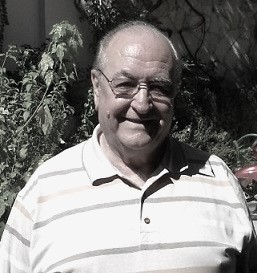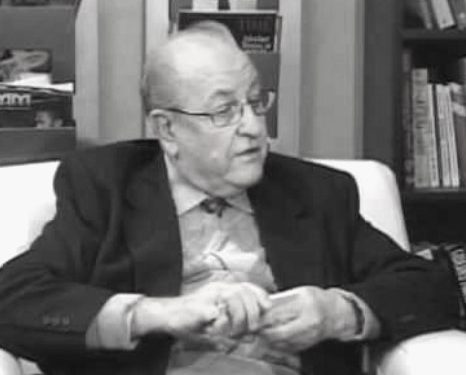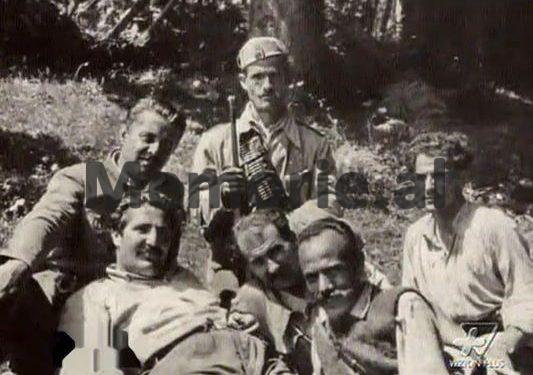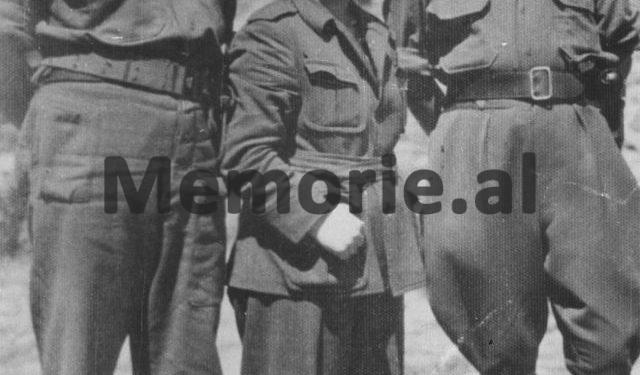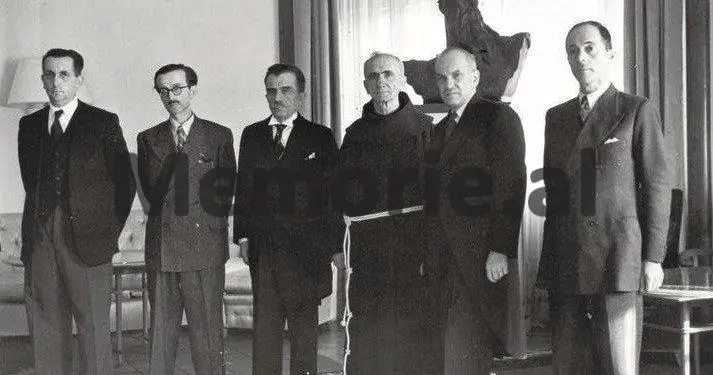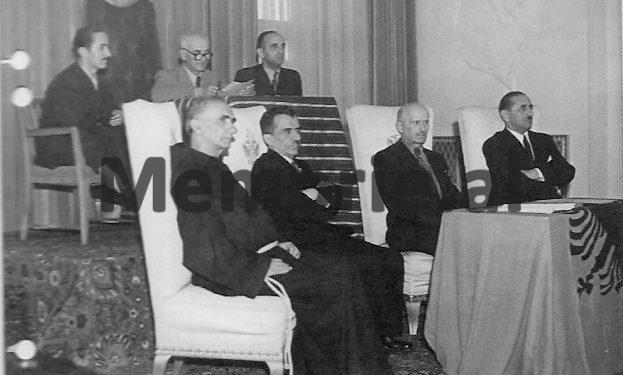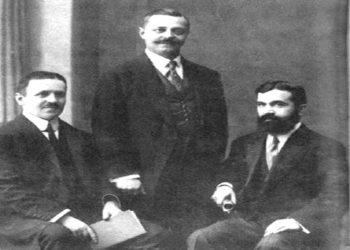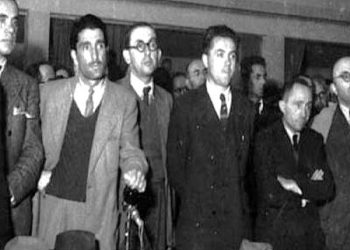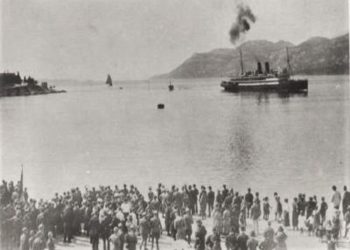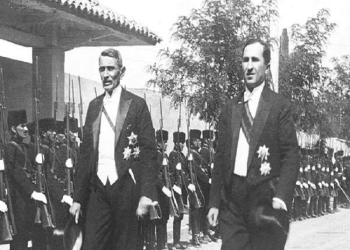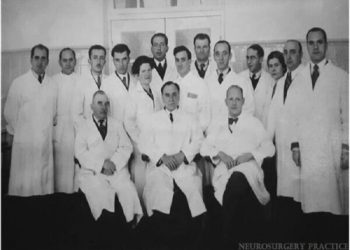By Thanas L. Gjika
Part two
– Essay on the analyst, Eng. Mërgim Korça –
Memorie.al / Eng. Mërgim Korça, in Albanian letters, is one of the truly free analysts of the post-communist period, who with his works has expanded and expands the horizon of readers, has opened and continues to open new avenues for solving problems left pending before our society, yesterday and today. He has written many articles in various forums and newspapers, most of which he has also published in three well-received collections: Histori të Pashkruara (Unwritten Stories) (268 pp, 2005), Hedhje Drite Rreth Shtrembërimesh Historike (Shedding Light on Historical Distortions) (247 pp, 2008), and Çështja Kolaboracionizëm e të tjera, t’i Gjykojmë (The Issue of Collaborationism and Others, Let’s Judge Them) (515 pp, 2014).
Continued from the previous issue
Former officials of the communist regime, such as Nexhmie Hoxha, Ramiz Alia, Liri Gega, Liri Belishova, Rahman Parllaku, etc., were targeted for their shameful and criminal deeds, exposing their inhuman mentality, disfigured by communist ideology. In contrast to such politicians, he also portrays the former head of the Shkodër communist group, Zef Mala, whom he had the opportunity to meet in 1954, after Mala was released from prison.
The communist Mala had met opponents of his political ideas, clerics and anti-communists, such as Xhevat Korça, in prison. After conversations with them, this former early communist sobered up and understood the anti-human essence of the communist doctrine, something that most former communists convicted by the dictator, such as; Liri Belishova, Todi and Liri Lubonja, Fadil Paçrami, etc., etc., could not do.
The greatest damage of the communist ideology implemented by the dictator Hoxha, explains the analyst, was the creation of the new socialist man, an immoral, unscrupulous being, who does evil and never asks for forgiveness, a being who has taken power in Albania and does not care about the people’s troubles, but only how to enrich himself.
Even Dritëro Agolli, the talented poet and much praised during the time of the dictatorship and the transition, the so-called “Patriarch of Albanian Letters,” is criticized for the lack of expansion of his mental perspective, for the lack of morality.
At the Xth Congress of the PPSH, this deputy severely criticized the “four major faults,” as well as the deeds of his party, but as a member of its former Central Committee, where he had been a militant for years, he did not ask for forgiveness for what he himself had done during the dictatorship, and even worse, during the transition years he turned into a defender of the policy of the Socialist Party, the daughter of the PPSH, thus remaining a pen that worked to praise the wrong policy of the party: PKSh, PPSH, PSSh.
At the same time, Mërgim has not failed to criticize the mistakes of post-communist officials, such as Presidents Alfred Moisiu and Bamir Topi, Deputy Prime Minister and Foreign Minister Edmond Haxhinasto, etc.
Mërgim the analyst’s values do not only lie in critical analyses. He is equally engaging when he appreciates distinguished writers, such as; Gjergj Fishta, Visar Zhiti, scientists like Dr. Edor Kabashi, the soprano singer, Ermonela Jaho, statesmen and perfect patriots, like Luigj Gurakuqi, and later ones, like Safet Butka, Prenk Cali, etc., etc.
Mërgim’s writings arouse respect and sympathy for the sons of the princely family of Mirdita, such as Gjon Markagjoni and his sons and for the most suffered among them, Gjon Markagjoni the Younger, whom he evaluates with great respect, for their honesty, pure Albanian morality, and manliness. Respect and love are also aroused in the reader by the writings where he values martyred clerics, such as Pater Anton Harapi, Pjetër Mëshkalla, Father Giovanni Fausti, etc.
In this vein is the critical review published these weeks in the media by Mërgim, for the volume of memoirs published in 2015, written in 1966, by Xhelal Staravecka, titled; “Përpara Gjyqit të Historisë” (Before the Tribunal of History) and published by his son Naim Staravecka. The article writer’s sharpness is displayed here through the discovery of the counter-values of the volume, where he shows the lack of values in the person drugged by communist ideology, the former communist Xhelal Staravecka, who elevates the figure of Enver Hoxha, for non-existent values, as if he were a great ideologue and strategist, and not as he truly was, a servant of Josip Broz Tito and Stalin.
One of the most beloved and respected figures for Mërgim Korça is that of Baba Rexhepi (1901 – 1995), a Muslim cleric who escaped from dictatorial Albania, founder and leader of the Bektashi Tekke in Taylor, MI, USA. He and his family regularly visited the honored Baba twice a week, and he does not hesitate to state that his own worldview is significantly influenced by the sermons of this Baba, especially by the fundamental teaching, according to which, egoism is the source of all human evils.
Baba Rexhepi was one of the persecuted of the Albanian communist dictatorship, who, continuing the life of an honest cleric in the USA had also arrived at some of his own thoughts to testify to the essence of the evil that came to Albania. “First,” he said, “from the monstrous crimes that began during the Anti-Fascist War, then from the unprincipled war against religious beliefs, and further, from the elevation to a cult and blind obedience to the dictator’s personal leadership. When the sense of morality is lost,” emphasized Baba Rexhepi, “the way is opened to all the evils of this world.”
Mërgim values the words of this preacher as a motto for everyone’s mentality: “Honest is he who changes his opinions to align them with the truths. Whereas dishonest is he who changes the truths to align them with his opinions…! My role is nothing more than to pity and forgive, while it is up to society to judge based on the truth and decide based on justice.”
The field where Mërgim Korça’s analytical sharpness shines with blinding light is the field of Albanian history, of the period of the Second World War and after it, through a series of polemics with professors and academics, i.e., with the representatives of the high levels of Albanian historical sciences. Without having the formal education of a historian, but walking his autodidact path, through numerous readings in the languages he masters, aided by his strong logic, honesty, and solid democratic convictions, Mërgim compiled a series of polemical analyses with academics Kristo Frashëri and Arben Puto, with Professor Paskal Milo, etc.
He points out that the evaluations that these personalities and others had given during the time of the dictatorship for the various events of the Albanian people were wrong, due to politicization. Whereas the evaluations that these same people continued to give to those events even after 1992, just as during the time of the dictatorship, prove to Mërgim that they remained slaves of the communist mentality, that they lacked the courage to admit that they had once been wrong.
When new facts had become known and when different interpretations had been published, the identical attitude of these academics and their colleagues, first and foremost stemmed from the lack of character, from the corruption of conscience that these scholars had suffered during the communist regime.
The Variants of Collaborationism and the Stance that Should Be Taken Towards Them
One of the most debated topics in analyst Korça’s writings is the issue of collaborationism, the interpretation of which distinguishes him from all those who have used and interpreted it before him. His clarification of Albanian collaborationism constitutes one of the greatest challenges that this analyst has posed to our scholars of Albanian history. As for the scholars of Albanian ethnology, this analyst has made them blush with the detailed analysis he has made of the chapter “VRASA” (Murder/Crime) in the Kanun of the Mountains.
The leaders of the PKSh / PPSH, the political and scientific literature of the communist dictatorship era and after it, declared and fought the phenomenon of collaborationism, cooperation with the occupier, as the greatest evil of the Second World War, as a bogeyman to manipulate the people and hide their base deeds.
Prominent activists of the national cause, who for many, many years since the Renaissance, worked for the good of the homeland, risking their lives and spending their wealth, during the Second World War, to save what could be saved under the Italian or German occupation, agreed to cooperate with the occupier, taking high governmental duties, which they exercised for a year, or a little longer, but as a rule, only in the interest of the country.
To lump together the governments that were created during the occupation, such as the government of Shevqet Vërlaci (April 1939 – December 1941) with the government of Mustafa Merlika Kruja (December 1941 – January 1943), or with the Regency Council, which the Albanian Parliament created during the German occupation (October 1943 – October 1944), with representatives; Mehdi Frashëri, Lef Nosi, Pater Anton Harapi, and Fuat Dibra, is scientific short-sightedness and political baseness.
It is scientific short-sightedness and political baseness because the truly collaborationist governments, like that of Vërlaci, accepted cooperation simply for chair interests, while the Merlika Government and the Regency Council accepted cooperation with the occupier for the good of the homeland and not for chair interests. The patriotic biography of the members of these governments, which Mërgim reveals with facts, clearly demonstrates that they staked their honor and patriotism for the good of the nation and not for personal gain.
Based on various dictionaries and historical data from the history of various European states, such as France, Denmark, Norway, etc., which experienced foreign occupation during the Second World War, Mërgim elaborates on the terms; “collaborationism” and “quisling,” as concepts, and based on concrete historical data, manages to clarify that in Albania, we have had nothing similar to the Quisling of Norway and that in Albanian life, we must distinguish two main types of collaborationism:
- Collaborationism for the good of the homeland and
- Collaborationism for self-serving power-hungry interests.
And here, the analyst Mërgim Korça is not referring to a specific collaborator at all, but, based on archival materials, articles, and speeches of the main leader of the PKSh, he clearly and convincingly reveals that; Enver Hoxha, with his demands for the union of Albania with Yugoslavia, published in the plenums of the PKSh, and with the total submission to the Soviet Union of the dictator Stalin and to Mao Zedong’s China, was nothing else but a collaborationist for self-serving power-hungry interests, for holding power at any cost and under any circumstances.
Mërgim Korça’s conclusion is understandable to everyone: historians should fundamentally condemn both sides of the collaborators, such as; Mustafa Merlika, Pater Anton Harapi, Lef Nosi, whom the communist regime condemned to the firing squad because they collaborated with the fascist or Nazi occupiers for the good of the homeland, as well as Enver Hoxha, who collaborated for 40 years, purely for his self-serving power-hungry interests, with Josip Broz Tito, Stalin, and Mao Zedong, putting Albania under their anti-Albanian communist dictates.
But, there is always a “but,” in the final analysis, conclusions should be drawn about who collaborated to serve the country and who for interests, initially group interests, and subsequently, purely personal interests!
Some Conclusions
Eng. Mërgim Korça is a representative of the patriotic and modern Albanian intellectual. Yesterday, with his engineering works, he solved many problems of Albanian agricultural mechanization, during the difficult time of the dictatorship. Today, utilizing the opportunities provided by the free life in the USA, he has created a set of valuable works, the results of which should be taken into account by those who are revising and will rewrite the history of Albania.
This analyst stands out for encyclopedic knowledge, systematic scholarly work, special memory, courage, etc.; qualities that the author of the preface to the second book, Professor Ardian Ndreca, also pointed out very well.
Mërgim Korça, as the well-known poet and writer, former political prisoner, Visar Zhiti, characterized him in the preface to the third book; “Entered strongly and confidently into the field of analytical writings, with a full baggage of knowledge and genuine experience, not as a late whim of his, which the conditions of freedom provided, but felt called by the time to tell the truth, where it was not known, was covered up, or was forgotten, intentionally or not, to discover unknowns of national importance, which give dignity to our history, where it had been eroded.”
His evaluation with the title “HONOR OF THE NATION” (NDER I KOMBIT), which he has long deserved, would simply be an honor that the current Albanian government does to itself, and not only to this engineer and analyst, who has always opened new paths for the Albanian economy and mentality.1
The Ministry of Culture of the Republic of Albania, these 25 years of transition, has c2arried out, along with some good works, also a national crime, an anti-culture work, by not showing any interest in the works written and published by the distinguished sons of the new Albanian diaspora, such as; Prof. Sami Repishti, Mërgim Korça, Eugjen Merlika, Pëllumb Kulla, Lek Pervizi, Ruben Avxhiu, etc., etc.
In my opinion, it should establish a working group as soon as possible to realize a collection of selected works from the prominent pens that have distinguished themselves during these 25 years, bringing new ideas for the evolution of the post-communist Albanian mentality and to correct various mistakes that have been made to our national history, by foreigners and by our politicized historians.
The publication of this collection in several thousand copies and its distribution throughout the country would help the general reader, especially students of humanitarian sciences, to use it as supplementary literature for a healthier scientific formation. Memorie.al




